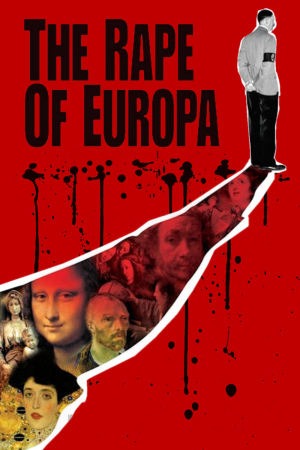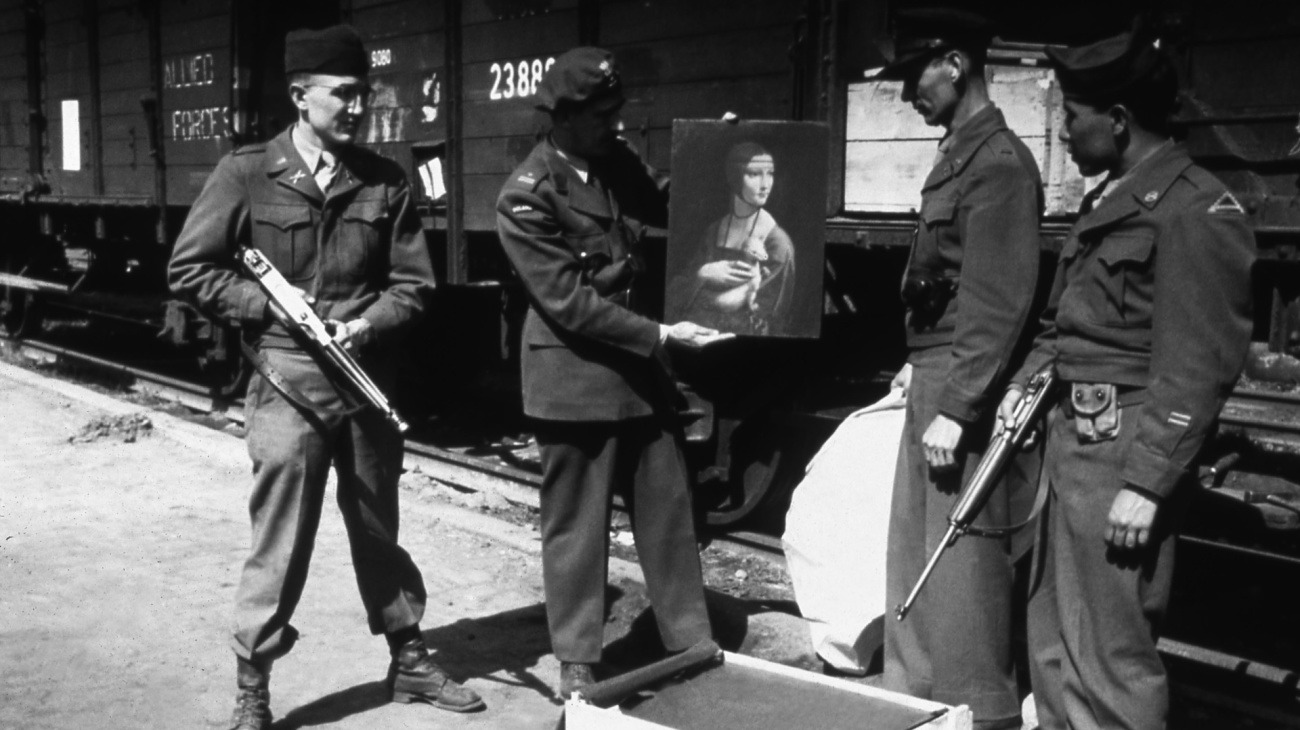
Artless
It's not an eternal question, but it ought to be: if a non-fiction film treats on a fascinating and poorly-understood topic, but it does so clumsily and without the least pretense to creativity, is it a success or a failure?
I was mostly recently confronted with this dilemma upon seeing The Rape of Europa, which exhausts the talents of three filmmakers on a surprisingly thorough study of the fate of the fine art of Eastern and Central Europe at the hands of the Nazis, and in the battlefields of World War II in general, and manages to come up stultifying and inert. Partially, I'm sure, this is due to the overall glut of documentaries about WWII that have been released in the six decades since that conflict's conclusion, and partly it's because Richard Berge, Bonni Cohen and Nicole Newnham have, with doubtlessly noble intentions, tackled such a huge chunk of history in a bit less than two hours that the final result could hardly be anything other than a rote catalogue of outrages.
To be sure, that history is well worth the study: as is well-recorded, Adolf Hitler, in the years before his political ambitions, had his heart set on studying painting at the Vienna Kunstgewerbeschule, but was turned down for admission the same year that Gustav Klimt and Oskar Kokoschka were accepted (leading to Kokoschka's quip, recounted in the film, that if their positions had been reversed, Hitler would have done much less damage as a bad painter and he, Kokoschka, would have been a much better world leader). The love of art as a status symbol remained with Hitler all his life, and led to his systematic pillaging of the art treasures of Poland and France to form the backbone of his private collection, and a further public collection that would have given the Third Reich the most important art gallery in the western world. In attempt to curry favor with Hitler and his fellow art-freak Hermann Goering, art collecting became a sort of mandated hobby for the officers of the Reich.
There's quite a lot just in that bare summary that's well beyond the generally-known narrative of the Nazi crimes against art, to say nothing of the endlessly strange details that that crop up as the filmmakers dig into the specifics of Hitler's obsession, Goering's posing and the generally daffy approach that the heavily traditionalist Nazi party took towards aesthetic valuation, and for that alone, The Rape of Europa ought to stand apart in a crowded subgenre. But it's all crammed in with the density of an undergraduate lecture, and largely presented with tedious clinical detachment.
Making matters worse is the film's midway shift from focusing on specific Nazi atrocities to consider the great matter of how Europe's great galleries and buildings, from the Louvre in Paris to the Hermitage in Leningrad to countless sites of great historic and architectural significance in Italy, fared during the war. Again, I don't want to slight the content of the film - this is compelling and vital stuff, guaranteed to provoke outrage and sorrow. But it's a matter of trying to cram too much into too little space, and so the film, though it goes into great detail about many of its subjects, ends up feeling overcrowded and tiring. And the filmmakers still don't manage to cover all the ground that needs covering, is this is to truly be the definitive work on the subject.
Let me be clear: this isn't "bad." It's smoothly professional every step of the way, combining talking heads interviews with nearly every living person who could possibly have a say in the matter, and everything is underlined with crisp, clean and dispassionate narration from Joan Allen. But the professionalism of the whole affair only points out its lifelessness. This simply doesn't feel like a movie, it feels like a particularly expansive History Channel special. Perhaps when the film is on TV and video, this very weakness will prove to be a strength, and it will fit more comfortably in the less heightened realm of the small screen.
So pervasive is the smallness in the movie's presentation that I caught myself putting together a different documentary on the same topic: instead of a two-hour theatrical movie, this feels like a natural fit for a miniseries: one episode on Hitler's fantasies, one episode on the Allies' destruction, one episode on restitution of plunder to the Holocaust survivors, and so forth. Although at that point it's easy to wonder if the subject ever needed a deeper treatment than Lynn Nicholas's eponymous (Nicholas, incidentally, is one of the film's interview subjects).
With all its competence, this is just not that compelling a film, and that is a crushing shame. I think we can all be glad that these stories are being told, but that doesn't excuse the half-measures that the filmmakers take in telling them. The Rape of Europa commits a truly magnificent blunder, in that it manages to treat a vital and untapped subject with so little imagination or narrative insight that it renders one of the most arresting untold stories of World War II into something quite unaccountably boring.
6/10
I was mostly recently confronted with this dilemma upon seeing The Rape of Europa, which exhausts the talents of three filmmakers on a surprisingly thorough study of the fate of the fine art of Eastern and Central Europe at the hands of the Nazis, and in the battlefields of World War II in general, and manages to come up stultifying and inert. Partially, I'm sure, this is due to the overall glut of documentaries about WWII that have been released in the six decades since that conflict's conclusion, and partly it's because Richard Berge, Bonni Cohen and Nicole Newnham have, with doubtlessly noble intentions, tackled such a huge chunk of history in a bit less than two hours that the final result could hardly be anything other than a rote catalogue of outrages.
To be sure, that history is well worth the study: as is well-recorded, Adolf Hitler, in the years before his political ambitions, had his heart set on studying painting at the Vienna Kunstgewerbeschule, but was turned down for admission the same year that Gustav Klimt and Oskar Kokoschka were accepted (leading to Kokoschka's quip, recounted in the film, that if their positions had been reversed, Hitler would have done much less damage as a bad painter and he, Kokoschka, would have been a much better world leader). The love of art as a status symbol remained with Hitler all his life, and led to his systematic pillaging of the art treasures of Poland and France to form the backbone of his private collection, and a further public collection that would have given the Third Reich the most important art gallery in the western world. In attempt to curry favor with Hitler and his fellow art-freak Hermann Goering, art collecting became a sort of mandated hobby for the officers of the Reich.
There's quite a lot just in that bare summary that's well beyond the generally-known narrative of the Nazi crimes against art, to say nothing of the endlessly strange details that that crop up as the filmmakers dig into the specifics of Hitler's obsession, Goering's posing and the generally daffy approach that the heavily traditionalist Nazi party took towards aesthetic valuation, and for that alone, The Rape of Europa ought to stand apart in a crowded subgenre. But it's all crammed in with the density of an undergraduate lecture, and largely presented with tedious clinical detachment.
Making matters worse is the film's midway shift from focusing on specific Nazi atrocities to consider the great matter of how Europe's great galleries and buildings, from the Louvre in Paris to the Hermitage in Leningrad to countless sites of great historic and architectural significance in Italy, fared during the war. Again, I don't want to slight the content of the film - this is compelling and vital stuff, guaranteed to provoke outrage and sorrow. But it's a matter of trying to cram too much into too little space, and so the film, though it goes into great detail about many of its subjects, ends up feeling overcrowded and tiring. And the filmmakers still don't manage to cover all the ground that needs covering, is this is to truly be the definitive work on the subject.
Let me be clear: this isn't "bad." It's smoothly professional every step of the way, combining talking heads interviews with nearly every living person who could possibly have a say in the matter, and everything is underlined with crisp, clean and dispassionate narration from Joan Allen. But the professionalism of the whole affair only points out its lifelessness. This simply doesn't feel like a movie, it feels like a particularly expansive History Channel special. Perhaps when the film is on TV and video, this very weakness will prove to be a strength, and it will fit more comfortably in the less heightened realm of the small screen.
So pervasive is the smallness in the movie's presentation that I caught myself putting together a different documentary on the same topic: instead of a two-hour theatrical movie, this feels like a natural fit for a miniseries: one episode on Hitler's fantasies, one episode on the Allies' destruction, one episode on restitution of plunder to the Holocaust survivors, and so forth. Although at that point it's easy to wonder if the subject ever needed a deeper treatment than Lynn Nicholas's eponymous (Nicholas, incidentally, is one of the film's interview subjects).
With all its competence, this is just not that compelling a film, and that is a crushing shame. I think we can all be glad that these stories are being told, but that doesn't excuse the half-measures that the filmmakers take in telling them. The Rape of Europa commits a truly magnificent blunder, in that it manages to treat a vital and untapped subject with so little imagination or narrative insight that it renders one of the most arresting untold stories of World War II into something quite unaccountably boring.
6/10
Categories: documentaries, joyless mediocrity, movies about wwii






